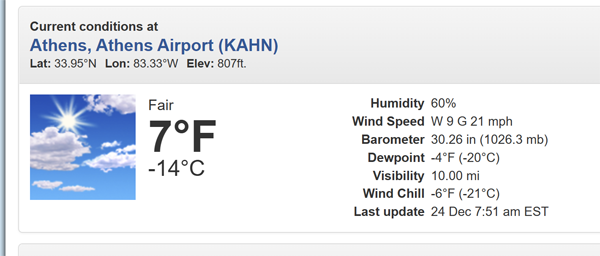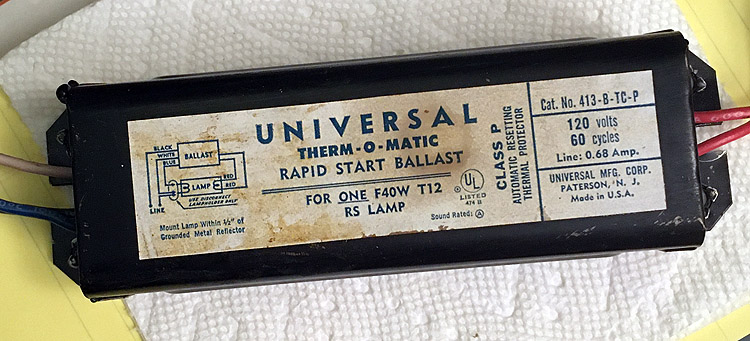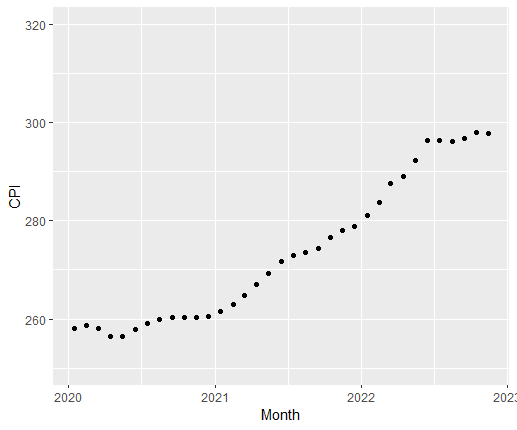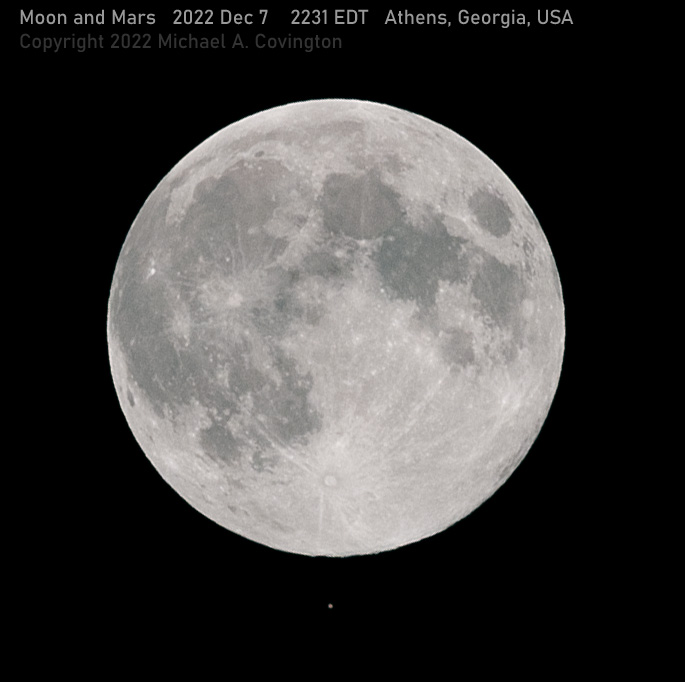 |
|
 |
2022
December
31
|
The 1-and-99 system for packing when you move
When I moved out of my UGA office, I packed its contents into boxes using a system
that Cathy thinks I should share with the public.
Let's call it the 1-and-99 system.
Knowing I would use considerably less than 100 boxes, I started with two boxes,
which I numbered 1 and 99.
Box 1 got the most important, most urgently needed things that were waiting to be packed.
Then box 99 got the least important things — things that were not trash,
but might not be needed for a quite a while.
Then I moved on to Box 2 and then Box 98. And so on, alternating.
When I got home, I unpacked boxes in order. Some of the highest-numbered ones
have not been unpacked. If you were moving a household rather than an academic office,
those might be the things to give to charity.
I'm told that books on home organization don't mention this method.
That doesn't surprise me.
I invented it based on methods of allocating computer memory.
Use it if you find it useful.
Permanent link to this entry
A questionable vacation
FormFree is giving us a total of 11 days off from work — the week between
Christmas and New Year's, plus the Friday before that week and the Monday after it,
comprising seven work days and two weekends.
I was looking forward to resting up and getting plenty of hobby and workshop time,
but I had a time-consuming medical test the day it started, which I needed
to rest up from, and immediately we had a severe weather event on top of Christmas.
Somehow, the vacation didn't really seem to start until today, a solid week after
the first day of it. But Christmas came, and we are here together, and Sharon, in
particular, is much healthier than a year ago.
What was 2022? Hopefully the last of three strange years; we are seeing a return
to normalcy in both public health and politics. I won't be writing an end-of-year wrap-up
here; what has happened is rather obvious, but we are still waiting for dust to settle.
Permanent link to this entry


|
2022
December
28
|
And Christmas came

Christmas came this year, and one of the most noticeable developments was Sharon's increased
energy level. She really put some effort into getting presents for the rest of us
(even a USB volt-ammeter for me — a very specialized thing I had no idea I was getting,
but it's extremely handy) and helping us "do Christmas."
Other memorable presents include a Panama hat from Melody to me,
and a guitar case to Melody from Sharon and me
(she is resuming playing the guitar after a long lapse).
Dinner was a pasta and sausage casserole rather
than the traditional lasagna because extremely cold weather discouraged us from getting out
of the house. Sharon was well enough to go to church with us on Christmas (Sunday) morning.
It was an extraordinarily cold weekend.
Much of the country has had an almost unprecedented blizzard, with dozens
of deaths in New York State.
In the South, it was unseasonably cold and windy.

We had one frozen pipe with no further damage;
Cathy, in Kentucky, had frozen pipes with a minor flood but,
hopefully, a relatively easy repair;
and my first cousin Joe Roberts and his wife lost their whole house in a fire.
(If you know him
and want to help, contact Crosland
Baptist Church, Norman Park, Georgia.)
FormFree is closed until after New Year's, and I'm using the week to try to get some
much-needed rest!
When I originally wrote this, I forgot to mention a couple of big things.
As a present to each other, Melody and I are updating our 1980-1990s stereo system.
There's a new Onkyo receiver that takes Bluetooth input from our laptops, as well
as receiving TV sound digitally on a fiber optic cable, and CD sound digitally on a
coaxial cable (I need to look into what the signal format is).
And a new "audiophile-grade" Onkyo CD changer to help us enjoy Melody's enormous
CD collection.
Our big present to each other is of course the remodeling of the master bathroom,
which is asymptotically approaching completion.
We thought we might be getting about three weeks of all-day work.
Instead, between supply shortages and labor shortages, we're getting a lot of short
work sessions, often spaced days apart. But it's almost finished!
Before:

After:

Permanent link to this entry


|
2022
December
25
|
Feast Day of the Nativity of Our Lord

Peace and all good wishes to you and yours!
Permanent link to this entry


|
2022
December
22
|
Why propagandists want you to watch and listen, not read
(Today I am posting several things I've recently written on Facebook or LinkedIn.)
The 1970s equivalent of "ya gotta watch this video" was "listen to these cassette tapes."
Does anybody remember when medical, political, and spiritual quackery traveled that way?
Whether audio or video, the reason for not using written communication
is to commandeer your attention for a long time without letting you pause and think —
and also to make sudden leaps of logic without giving you time to think.
If you were reading something, you might pause and think, or even look at another book. Quack tapes and videos are designed to prevent that.
(From a conversation with Tom Darrow.)
Permanent link to this entry
Against science-fiction AI
The humanlike "artificial intelligence" in science fiction is fiction.
It is as artificial as genies or talking animals in other kinds of fiction.
Real AI consists of tools for human beings, to make computers more useful.
There is no known technical path to "make computers think like people" — it is not at all like
putting a man on the moon, which we could plan in detail 30 years before we did it.
As Cassie Kozyrkov hammers home in the essay I'm about to link to,
when people talk about machines thinking like people, they usually
don't even have a clear idea what that is supposed to be.
Read her excellent essay here.
I would add one more BIG point: AI is not just machine learning.
It also includes knowledge-based systems, logic programming, natural language processing,
computer vision, and several other things.
Permanent link to this entry
A note about It's a Wonderful Life
People are bothered by the notion, in the movie It's a Wonderful Life,
that if George had not existed, Mary would not have married anyone at all.
Surely, they say, a pretty girl like that could find a husband.
But Melody and I both have remarked that if we had not met,
we are not at all sure that either of us would have gotten married at all.
Neither of us is the kind of person that could choose a mate at random from dozens of superficially attractive prospects.
The key is that It's a Wonderful Life was made in 1946, depicting 1930s courtship,
long before late-1950s competitive dating became a part of high-school life.
Back then, it was not at all uncommon to recognize a very suitable person
from a distance and set out to win their heart.
It wasn't until the 1950s that it became common to rapidly mix everybody together and see who sticks.
And it is actually rather degrading to assume that a pretty girl's only purpose in life
is to catch a husband.
Here is a review by Clare
Coffey that makes a closely related point and expands on it.
Permanent link to this entry
Comparison of the day
Things I've heard myself saying:
"Explaining the difference between my AI work and ChatGPT is like explaining the
difference between a motorcycle and an armadillo. You hardly know where to begin..."
Permanent link to this entry


|
2022
December
18
|
End of an era

Tonight, December 18, I replaced the last inductive fluorescent-lamp ballast in our
kitchen; it had failed a few weeks ago.
This vintage-1974 house has a suspended ceiling in the kitchen, with ten (10) 48-inch
fluorescent lights above it. Since we moved here in 1985, we have been replacing
not only the fluorescent tubes, but also the ballasts, replacing every failed or finicky
inductive ballast with an electronic one. By now, every one of the
tubes is actually an LED lamp designed to replace a fluorescent tube,
so the ballasts are anachronisms,
including the one I put in tonight; there is another kind of LED tube that will
fit in the same fixture with the ballast taken out.
The reason I did it this way is that we had done the changeovers incrementally,
replacing whatever failed when it failed.
We wanted to keep all 10 light fixtures
compatible with each other.
(For troubleshooting, tubes can be swapped between any of them;
that's a convenience I didn't want to lose.)
So now we have 10 anachronisms, but at least they are in step
with each other.
This ballast wins the longevity award: it gave 48 years of service.
Permanent link to this entry


|
2022
December
16
|
What I want from a religion
[Previously posted on Facebook.]
Fellow Christians: This is so far back, so preliminary to the Christian message that we normally present, that you may overlook it.
But I find that one of the things I have to communicate to non-Christians is:
I am not looking for a sense of "spirituality."
I am not looking for a religion that will get me what I want.
I am not looking for a feeling.
I am looking for a source of wisdom greater than myself,
something that will make me wiser and tell me what to want.
And make me objectively better.
That is a basic point that is easily overlooked, and if you're talking to people
who don't see it that way, you may be talking past each other and not know it.
Nonbelievers nowadays don't say, "There is no God." They say, "It's rude of you to
challenge my beliefs."
The supreme evil, to many people, now is challenging or disagreeing with someone else's
personally-made-up values. ("Never criticize.") The idea is that you should make up something for yourself
and then look for affirmation. The idea that wisdom could come from outside yourself,
and could challenge what you made up for yourself, has gone out the window.
Of course, we also have another set of problems now that much of the public, and seemingly
all of the news media, thinks Christian doctrine is simply a brand or set of brands of
right-wing politics. Great harm has been done to the name and cause of Christ.
Permanent link to this entry


|
2022
December
13
|
Inflation chart

This is the CPI-U, including today's just-released number.
As you can see, we had high inflation through 2021 and the first half of 2022.
We're not having high inflation now.
Headlines are still saying things like "Inflation rose 7% last month."
Inflation didn't rise, inflation fell.
Prices rose 7% over the past year, but almost all of the rise
took place several months ago.
There are still very mixed price changes going on.
Some goods and services are becoming cheaper, and others are still
becoming more expensive.
This is the postwar, or rather post-COVID, economy;
things aren't the same as before.
And we have a small upturn in COVID, and I'm hearing about friends
coming down with it. I hope that, like the previous one, this COVID surge
fails to get off the ground.
Permanent link to this entry


|
2022
December
11
|
A widely misunderstood Bible verse
"Glory to God in the highest, and on earth peace, goodwill to men"
is a nice Christmas greeting, but it's not what Luke 2:14 actually says.
First, a detail. "Glory...in the highest" means "glory...in highest Heaven"
(or "in the highest places"), and not, as we could easily take it, "maximum glory."
This is undisputed; it's just something easy for us to misunderstand.
The King James Version was translated from a manuscript that said
δόξα ἐν ὑψίστοις θεῷ καὶ ἐπὶ γῆς εἰρήνη ἐν ἀνθρώποις εὐδοκία,
"glory in the highest (places) to God, and on earth, peace among human beings, good will."
That is not quite grammatical — the last word is just tacked on — and the
best we can do is understand an "and" in front of it. "Peace and good will among human beings."
(Not "to.")
It turns out that many more ancient manuscripts, not only those available all long
but also some relatively recently discovered, say εἰρήνη ἐν ἀνθρώποις εὐδοκίας
"peace among people of good will" — the s at the end makes it genitive (possessive).
That's the source of the Latin Vulgate's pax hominibus bonae voluntatis.
Metzger's Textual Commentary points out that in early Christian times, it was common
to write an s at the end of a word as a small mark; to this day it is written ς rather
than σ, and it used to be written smaller, superscript.
If you learned Greek letters only in the context of science and mathematics, you
have seen only the mid-word form of lowercase sigma.
But sigma is very often the last letter of a Greek word, and they wanted a quick way
to write it.
"Good will" isn't quite right either;
εὐδοκία means something like "good choice" or "choice based on being pleased with something."
In fact, Metzger points out that in the Dead Sea Scrolls, there are passages in Hebrew where
"people of (God's) good choice" means the Chosen People.
So the actual message of Luke 2:14 is, "Glory to God in highest Heaven,
and on earth, peace to the nation of Israel."
Permanent link to this entry
A tiny bit of New Testament geography
I've never paid enough attention to geography in the New Testament
(the whole Middle East is small by U.S. standards).
Here's a quick refresher for understanding the Christmas story:
-
From north to south, the Sea of Galilee, River Jordan, and Dead Sea are in a long, narrow valley about 15 miles wide,
some of which is below sea level — a real wrinkle in the earth's surface.
-
Galilea is the northern end of this region; Judea is the southern end; and the Samaritans
(a sect that split off from Judaism) are along the middle, west of the river.
-
Jerusalem and Bethlehem are in Judea, on a high mountain ridge west of the Dead Sea.
(More dramatic wrinkling of the earth's crust.)
When people talked about going "up" to Jerusalem, they meant going up into the mountains.
"Up" certainly didn't mean "northward" to them; they didn't have maps like ours.
-
Nazareth, Capernaum, and Cana (among other places) are around the sea of Galilee,
in Galilea. That's where Joseph and Mary lived and Jesus grew up.
When Joseph and Mary went from Nazareth to Bethlehem, it was probably about a 90-mile
journey and could have been walked in 5 days if they were fast.
It was not a one-day trip, but Bethlehem was probably the only place where
lodging was scarce, since people were converging there.
Permanent link to this entry


|
2022
December
8
|
The language war over <- and = in R
(Originally posted on LinkedIn.)
I've stumbled upon a language war. In R, the traditional assignment operator is
<- but for many years = has been available as an alternative.
And if you ask people which one to use, you find you're on a battlefield. Here is what I've been able to confirm:
- The Google R style guide says to use <- exclusively. (I don't work for Google.)
- The two operators have slightly different operator precedences.
- Some documentation says = can be used for assignment "only at the top level,"
i.e., when the assignment is an executable statement, the outermost part of an expression,
not an operation embedded in an expression. Well...
- My programming style is to only do assignments at the top level anyhow;
I find things like x <- (2 + y <- 3) confusing.
(That would be x=(2+y=3) in C, assigning 3 to y in the middle of doing something else with it.)
- The reality is that = works for assignment almost anywhere
(except when being used for its other purpose, labeling a named argument to a function).
But it doesn't work well in an expression that also has <- in it
(perhaps the product of a mind more twisted than mine).
I've tentatively decided to be modern and use = rather than be S-compatible and
use <-. Some of you are probably about to tell me I'm rendering myself unemployable in half of the industry...
Permanent link to this entry


|
2022
December
7
|
Moon almost hides Mars

This evening, much of the United States saw the moon pass in front of Mars.
I didn't, for two reasons: as seen from here, the moon didn't quite pass in
front of Mars, and anyhow I had to dodge clouds, waiting for small holes in them.
Nonetheless, I did get a good view with binoculars, and also a picture.
The picture was taken in haste, because ten minutes earlier, I thought the
clouds were not going to break. I used my Askar 200-mm f/4 telephoto lens
and Nikon D5500 (H-alpha modified) on a fixed tripod;
this is a single 1/500-second exposure at ISO 200 and f/4.
The only thing that went wrong is that I'd forgotten that the lens had my
broadband nebula filter installed in it, and I didn't have time to remove it,
so the color rendition isn't as good as it could have been.
(I did balance the color in Photoshop.)
50 years ago tonight I was watching the launch of Apollo 17 and then
camping nearby with the Action Trav'lers.
Permanent link to this entry


|
2022
December
5
|
Quality of government
[Previously posted on Facebook.]
I seldom comment about politics, but I want to point out something that is well known to people who study politics or international relations academically, but seldom gets mentioned in the media.
Perpendicular to the left-to-right, liberal-to-conservative, socialist-to-capitalist dimension, there is another dimension: Quality of government.
By quality of government I mean: does the government do its job? Do officials perform their duties fairly and efficiently? Does everyone get good service, or only those who are lucky, or pay bribes, or belong to the right special-interest group? Do legislators try to benefit all the people, or just special interests? Do policymakers pay attention to the actual effects of their policies, and adjust them if they are doing unintended harm? Do government employees at all levels do their jobs, or just randomly neglect them? Does some part of the government actually want to harm some of the citizens?
Countries with high expectations of quality of government include the US, Germany, Scandinavia, and (if I understand it well) Japan. It is no coincidence that these are places with strong economies. (Paradoxically, it can be a good sign when people complain about bureaucrats; it means they hold them to high standards.)
A shining, or maybe I should say stinking, example of bad government is Russia, which has managed to fail under several different systems (and, for decades, used a system that most people thought couldn't possibly work). Third-world countries often have bad governments. Think of places where you wouldn't want to live or do business, and that's probably why.
I think this is the missing dimension in a lot of our recent political discussion. Who wants to run the government well, to serve the citizens? Who doesn't?
Permanent link to this entry
A new verse for "Child in a Manger"
My one and only contribution to the world's supply of Christmas music was sung in public yesterday.
As long as First Baptist Church (Monroe, Ga.) keeps it on YouTube, you can
hear it by clicking here.
I thank Curtis Murdock (the minister of music you see directing the choir) for making this happen.
My contribution is an additional verse for the familiar song "Child in a Manger."
The additional verse is:
God above Heaven,
born of a virgin,
God beyond space, now
Sheltered on earth:
This day is holy!
Sing to the Saviour;
Angels and shepherds
Herald his birth.
I do not claim copyright on this particular verse; feel free to spread it around.
It is my translation and adaptation of a sixth-century Byzantine Greek canticle,
Η Παρθένος σήμερον, by St. Romanos Melodos.
Incidentally, one of my most favorite pieces of music is a piano arrangement of this tune,
much elaborated from the original; you can hear it performed
by its composer here.
Permanent link to this entry


|
| |

|
|
|
This is a private web page,
not hosted or sponsored by the University of Georgia.
Copyright 2022 Michael A. Covington.
Caching by search engines is permitted.
To go to the latest entry every day, bookmark
https://www.covingtoninnovations.com/michael/blog/Default.asp
and if you get the previous month, tell your browser to refresh.
Portrait at top of page by Sharon Covington.
This web site has never collected personal information
and is not affected by GDPR.
Google Ads may use cookies to manage the rotation of ads,
but those cookies are not made available to Covington Innovations.
No personal information is collected or stored by Covington Innovations, and never has been.
This web site is based and served entirely in the United States.
In compliance with U.S. FTC guidelines,
I am glad to point out that unless explicitly
indicated, I do not receive substantial payments, free merchandise, or other remuneration
for reviewing or mentioning products on this web site.
Any remuneration valued at more than about $10 will always be mentioned here,
and in any case my writing about products and dealers is always truthful.
Reviewed
products are usually things I purchased for my own use, or occasionally items
lent to me briefly by manufacturers and described as such.
I am no longer an Amazon Associate, and links to Amazon
no longer pay me a commission for purchases,
even if they still have my code in them.
|
|










